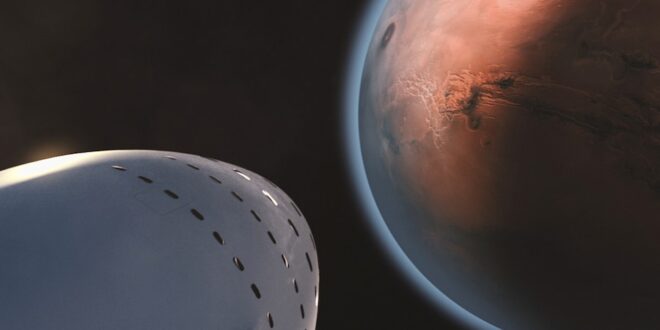What’s the human population on Mars? This question has fascinated scientists, space enthusiasts, and curious people worldwide.
A thriving Martian society is a tempting subject of curiosity and scientific research as human colonization of the Red Planet becomes more likely.
Mars’ reddish color and intriguing features have fascinated Earthlings for generations. Countless science fiction novels, films, and spacefaring pioneer aspirations have set it.
In recent decades, these dreams have become plans. NASA, SpaceX, and other international organizations are working hard to settle Mars.
The article will explore the fascinating subject of the human population and how it might look on Mars soon.
What’s the human population on Mars?
No humans are living on Mars. There have been multiple robotic expeditions to Mars, but no humans have visited.
Mars missions are planned, although they are far off. The distance, harsh environment, and cost of sending humans to Mars are huge.
Even if humans land on Mars, it will take years to settle. The first Mars colonists will face various obstacles.
However, many believe Mars colonization is vital to humanity’s future. They say Mars might be a backup plan for Earth and a source of new resources.
Overview of Planet Mars
Mars is the second-smallest planet in the Solar System, larger than Mercury and fourth from the Sun. Mars is called the “Red Planet” after the Roman god of war.
The latter alludes to Mars’s reddish color due to iron oxide, which stands out among observable celestial entities.
The History of Human Exploration of Mars
Mars exploration is long and continuing. The first spacecraft to reach Mars was NASA’s Mariner 4 in 1965. Since then, orbiters, landers, and rovers have visited Mars.
The most noteworthy Mars missions:
- Mariner 4 (1965): Mariner 4, the first spacecraft to orbit Mars, captured 22 photos.
- Mariner 9 (1971): The first spacecraft to orbit Mars, Mariner 9 captured the first detailed photos of its surface.
- Viking 1 and 2 (1976): The first Mars lander and rover. The landers investigated the Martian atmosphere and surface while the rovers explored.
- Mars Pathfinder and Sojourner (1997): Pathfinder was the first spacecraft to land on Mars gently using airbags. It carried Sojourner, the first wheeled Martian rover.
- Spirit and Opportunity (2004): Twin Mars rovers landing in distinct regions. Spirit ran for 6 years and Opportunity for 15.
- Phoenix (2008) landed on Mars’ northern polar region. It searched the Earth and ice for water.
- The Mars rover Curiosity (2012) is still running. The largest and most complicated Mars rover ever sent. Mars geology is being studied for signs of life.
- InSight (2018): Mars lander studying its interior. It has a seismometer to measure marsquakes and a heat probe to measure Martian interior temperature.
- Tianwen-1 (2021): Chinese mission Tianwen-1 has an orbiter, lander, and rover. The lander and rover landed on Mars in May 2021.
- Persistence and Creativity (2021): Mars rover Perseverance is investigating. The first spacecraft to land at Jezero Crater, an ancient lakebed, is it. The first helicopter to fly on another planet is Ingenuity.
These are some of the many Mars missions. Mars exploration is continuous and exciting, and we’ll learn more about it in the future.
Importance of Colonizing Mars
Humans may inhabit Mars for numerous reasons. The most significant reasons include the following:
- Searching for alien life: Mars, the most Earth-like planet in our solar system, had liquid water on its surface. This shows that Mars may have been habitable and could support life now.
- Learn about solar system history: Mars shows us our solar system’s past. Mars helps us understand planet formation and evolution.
- To create new technology: Colonizing Mars will require new space transport, robotics, and life support technology. These technologies could help develop new medical treatments or renewable energy sources on Earth.
- To provide a backup for humanity: Earth is prone to extinction. A Mars colony may back up humanity in case of an Earth tragedy.
- To investigate human colonization beyond Earth: Colonizing Mars would be a considerable human achievement. It would demonstrate our ability to travel and live on other planets, allowing human habitation beyond Earth.
The Challenges of Sending Humans to Mars
Many obstacles make sending humans to Mars difficult. Some of the most important:
- The distance: About 54 million miles (87 million kilometers) from Earth is Mars. Even at top speeds, it takes six months to get there.
- The radiation: The Mars mission exposes people to high radiation. This can raise their cancer and other health risks.
- Water and food: Astronauts must bring adequate food and water for the trip and Mars stay. The food and water will add weight to the spaceship, making the launch harder.
- Living circumstances: The Martian climate is severe. No liquid water is on the surface of the thin, chilly atmosphere. A pressurized shelter will shield astronauts from the elements.
- The health dangers: Living on Mars poses severe health hazards. Radiation, dust, and bacteria are examples. Health issues must be managed appropriately for astronauts.
- The psychological barriers: Long-term solitude on Mars can harm astronauts’ mental health. They must mentally prepare for living in a challenging environment and being away from family and friends for a long time.
Many motivations exist to send humans to Mars, notwithstanding the hurdles. We can travel to Mars and explore new methods to make it easier. We also have the science to send humans to Mars.
Ethical Dilemmas of Colonizing Another Planet
Colonizing another planet is complex and ethically questionable. The most pressing ethical challenges include:
- Right to colonize: Who can populate another planet? Only countries or organizations have the resources. Should everyone inhabit equally, regardless of wealth or power?
- Impact on indigenous life: What are the ethical consequences of colonizing Mars if life exists? Should we avoid harming or displacing life?
- Mars is rich in resources, but how should they be used? Should they help only colonists or everyone?
- Impact on Earth: Mars colonization could have unforeseen effects on Earth. It could boost resource rivalry or distract investment from Earth’s most pressing issues.
- Conflict: Colonizing Mars could cause intergroup conflict. Countries or organizations fighting for global control may conflict.
These are some ethical issues to consider before colonizing another planet. There are no simple solutions, and the best approach will depend on the situation.
However, a thoughtful and ethical dialogue about these issues should precede such a monumental undertaking.
More ethical issues may arise from colonizing Mars:
- Impact on future generations: Mars colonization could affect future generations. It might create a stratified society with colonists having a significant advantage over Earthlings.
- The risk of exploitation: Mars colonists may use its resources without considering future generations or the planet.
- Cultural identity loss: Colonizing Mars may cause people to lose their culture. The hostile Martian environment may push them to adopt new customs and ideals.
The Challenges of Living on Mars
Living on Mars has several obstacles. Major obstacles include:
- Mars: The harsh climate is cruel. No liquid water is on the surface, and temperatures might drop. The thin atmosphere provides no solar radiation protection.
- The Martian atmosphere is thinner than Earth’s. Therefore, astronauts would be exposed to more radiation. This may increase their cancer and other health risks.
- Isolation and confinement: The astronauts would be isolated from Earth for months on the Mars expedition. This could cause despair and anxiety.
- Martian dust: Fine Martian dust is easily breathed. This could cause respiratory issues and include hazardous microorganisms.
- The Martian gravity is about one-third of Earth’s. This might damage astronauts’ bones and muscles, making walking harder.
- Self-sufficiency: A Mars colony must create food, water, and energy. This massive project would require a lot of technological advancement.
- Cost of Mars material and passenger transport: Sending a spaceship to Mars is expensive. The endeavor would be economically unfeasible, making colonization difficult.
- Accident and disaster risk: The trek to Mars and colonization would be dangerous. Accidents like spacecraft failures or natural disasters are possible.
These are some of the obstacles to colonizing Mars. It is a complex challenge, but one many believe is worth attempting.
The Political Challenges of Colonizing Mars
The political challenges of populating Mars are numerous. Important challenges include:
- Mars sovereignty: Who controls it? A country, group of countries, or international organization?
- Mars resources: Who controls them? Will the first to arrive exploit them or share them equally?
- Laws and regulations: Mars’ laws and regulations? Will they match Earth’s rules or be new Mars-specific laws?
- Mars disputes: How will they be resolved? Will each nation have its own legal system or an international court?
- Security: How will Mars be protected? Will it be a military base or a peaceful colony? How will Mars’ environment be protected? What rules will avoid environmental damage?
Conclusion
What is the human population on Mars? The human population on Mars is an intriguing future space exploration prospect. Martian colonization continues to fascinate humanity despite the many impediments, from distance and radiation threats to the difficulties of existence in a hostile world.
Colonizing Mars is crucial. It could provide humanity with a backup plan for Earth’s uncertainties, scientific understanding, and technical advances. Mars might potentially be a step toward colonizing other planets.
The human population on Mars is a monument to our tenacious spirit of exploration and human inventiveness, not just technological prowess. While the road ahead is arduous, we must walk it for our future and legacy among the stars.
 Being Human
Being Human




